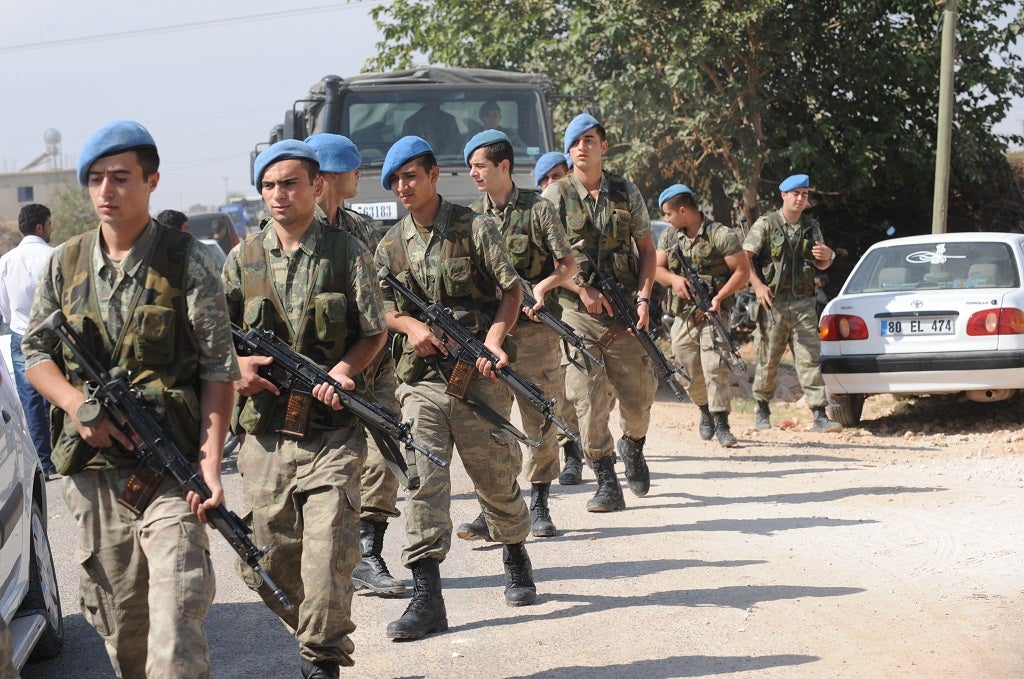This looks like the start of regional conflict in the Middle East - but neither Turkey nor Syria want war
Like everyone else Turkey has been caught off-guard by developments in the Arab world - and they have other threats to deal with than Syria

You wouldn’t expect Turkey to take the mortar assault from Syria this week lying down. And it hasn’t. This is exactly what Western diplomats have feared from the start: a Syrian civil war that sucks in its neighbours and ends up in a full regional conflagration.
Maybe it will but it’s a 19th-century way of looking at things. It’s not the Syrian troubles which are threatening the stability of the region. It is only one part of an Arab Spring which has destabilised the whole of the Arab world and the Middle East.
Syria has neither the means nor the interest in taking on Turkey at this moment. It is terrified of it. Hence the grovelling apology and offers of condolences which followed the original mortar attack.
But then neither does Turkey want war. True, it supports the rebels by allowing them to set up bases on its land and enabling a flow of arms to cross its border. True, too, that Ankara has consistently pushed for safe zones to be set up within Syria to cope with the flood of refugees – an act of war if Turkey or Nato were to move into Syria to impose them.
Turkey, however, is pushing for it to be done as an international act not a unilateral one. Nor, for all the public pronouncements that Assad must go, does Turkey wish to intervene militarily itself. When its aircraft was brought down by Syrian air defence in the summer, it confined its response to diplomatic protest.
Like everyone else, Turkey has been caught off-guard by developments in the Arab world. Prior to the troubles, it had maintained good relations with Iran and guardedly supportive relations with Assad.
It is easy to see Ankara seeking to use the Arab Spring as an opportunity to further its ambitions to be a major player in the Middle East. But it’s efforts to promote itself as an intermediary in the Iranian nuclear crisis for example have been thrown off balance, rather than helped by the Arab Spring.
To the shock of its government, the Turkish flag was burned in the first days of the uprising in Benghazi. Relations with Iraq have deteriorated badly with the Kurdish terrorist attacks from the Iraqi side of the border. Now the Syrian troubles are causing more difficulties even with public opinion in Turkey, which seems concerned rather than totally approving of Prime Minister Recep Tayyip Erdogan’s calls for the removal of the Assad regime.
Suggestions that the Syrian conflict could cause trouble among Turkey’s Alawite minority seem far-fetched. The West loves to see the Middle East troubles in terms of Shia-Sunni and other religious divides. But the Alevi in Turkey, although numerous, are not separatist nor particularly close to the Alawites in Syria.
Of far greater concern to Turkey is the Kurdish dimension. Regional instability has encouraged the extremist PKK movement to launch a succession of attacks on Turkey. Ankara’s fear now must be that the two million Kurds in Syria, who have risen up against Damascus and control a large part of Kurdish territory within Syria which they are operating as a separate entity, will team up with other armed Kurdish groups in Iraq.
Add to that the nationalist ambitions of Barzani, the President of the semi-autonomous Kurdish region of Iraq, and you can see why Turkey should be nervous. Again, the fears may be exaggerated. The Kurds of Syria – as with those of Turkey, Iran and Iraq – seem so far determined on autonomy rather than a new greater Kurdish state. But the prospect is there.
It won’t be national conflicts which will determine the future but the internal ones.
The real truth of the rial fall
Give the Iranians an event and there will be a hundred conspiracy theories to explain it. The collapse of the rial is no exception. According to one theory, it was manipulated by the enemies of President Ahmadinejad to unseat him. Another has it that the President himself orchestrated it, so desperate is he to have more local currency to fund his spending.
That old rogue the former President Rafsanjani is accused of being the culprit, causing chaos in response to the imprisonment of his son and daughter. But then another rumour has it that he deliberately gave his children up to clear himself for a run at the presidency in the elections next June.
Ahmadinejad blames it all on foreigners and sanctions, in language that mimics President Assad talking of the causes of the uprising against him.
The one explanation that isn’t doing the rounds is the most obvious one: that the rial had been held artificially high in the past, that the government was grossly overspent, Iranian oil revenues were down and the West’s financial sanctions were beginning to bite on international payments. We, of all people, should understand what it means to have a run on your currency and markets go into freefall. In the 1960s, we blamed it on the “Gnomes of Zurich”.
Join our commenting forum
Join thought-provoking conversations, follow other Independent readers and see their replies
Comments